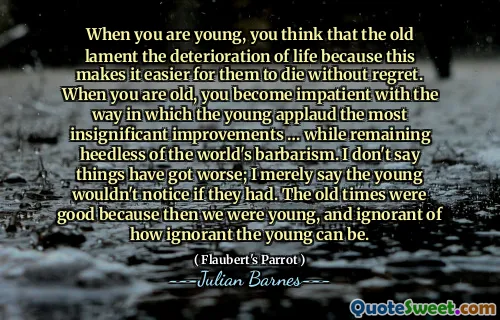Flaubert's Parrot, a novel by Julian Barnes, explores the life and works of the renowned French author Gustave Flaubert. Through the eyes of the protagonist, Geoffrey Braithwaite, the narrative delves into Flaubert's obsession with perfection in his writing, highlighting the author's struggle with the nature of artistic creation. Geoffrey, a Flaubert enthusiast, embarks on a journey to understand the author's motivations and intricacies of his most famous work, Madame Bovary.
The story intertwines themes of literary analysis and personal reflection, as Geoffrey grapples with his own life's challenges. The parrot, a metaphor for Flaubert’s writing, symbolizes the quest for authenticity and truth in literature. Through this lens, the novel questions the relationship between the author and their creations, examining how characters can often reflect the complexities of their creators.
Ultimately, Flaubert's Parrot is not just an exploration of Flaubert's legacy but also a commentary on the nature of art itself. Barnes invites readers to reflect on the impact of an artist's life on their works and the ways in which literature interacts with reality. The novel's innovative structure and playful use of narrative techniques challenge traditional storytelling, making it a profound meditation on both literature and the human experience.
More »
Today Birthdays
1729 -
Edmund Burke
1949 -
Haruki Murakami
1954 -
Howard Stern
1876 -
Jack London
1993 -
Zayn Malik
1951 -
Kirstie Alley
1863 -
Swami Vivekananda
1923 -
Alice Miller
1987 -
Naya Rivera
1825 -
Brooke Foss Westcott
1944 -
Joe Frazier
1951 -
Rush Limbaugh
1964 -
Jeff Bezos
1978 -
Jeremy Camp
1628 -
Charles Perrault
1856 -
John Singer Sargent
1970 -
Kaja Foglio
1953 -
Rick Santelli
1986 -
Gemma Arterton
1968 -
Raf Simons
1958 -
Christiane Amanpour
1966 -
Olivier Martinez
1996 -
Ella Henderson
1917 -
Maharishi Mahesh Yogi
1949 -
Ottmar Hitzfeld
1928 -
Ruth Brown
1968 -
Heather Mills
1946 -
George Duke
1968 -
Rachael Harris
1923 -
Ira Hayes



